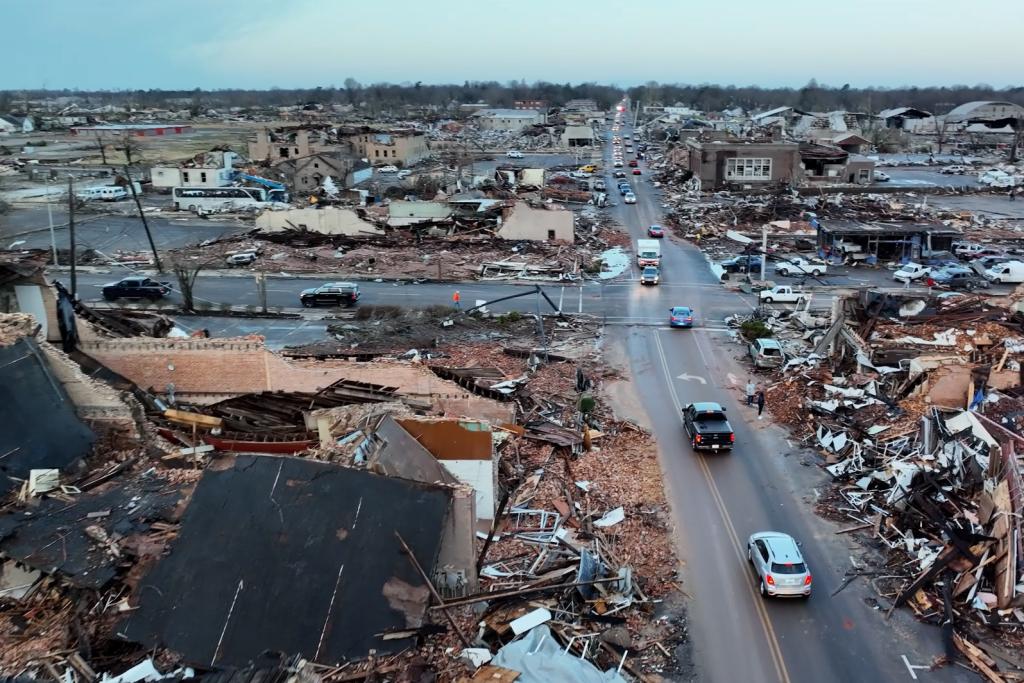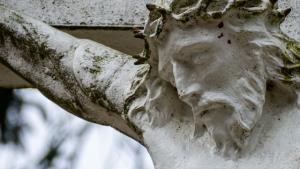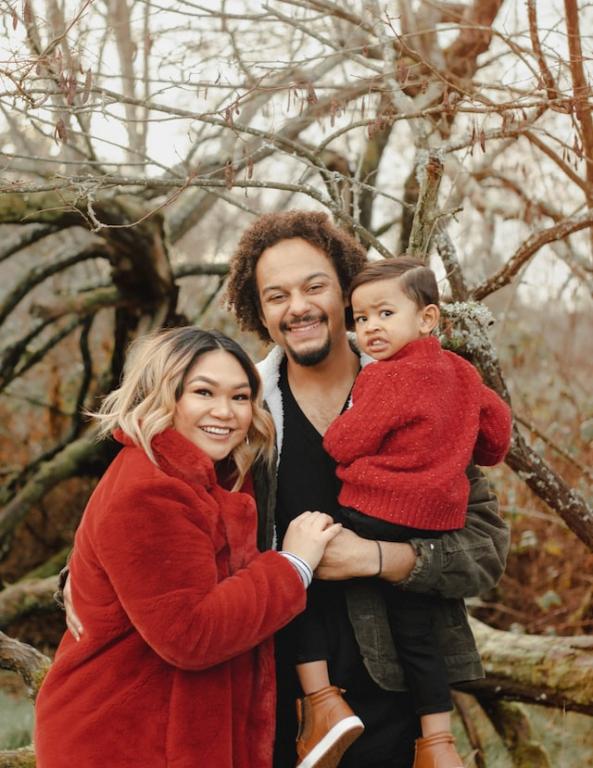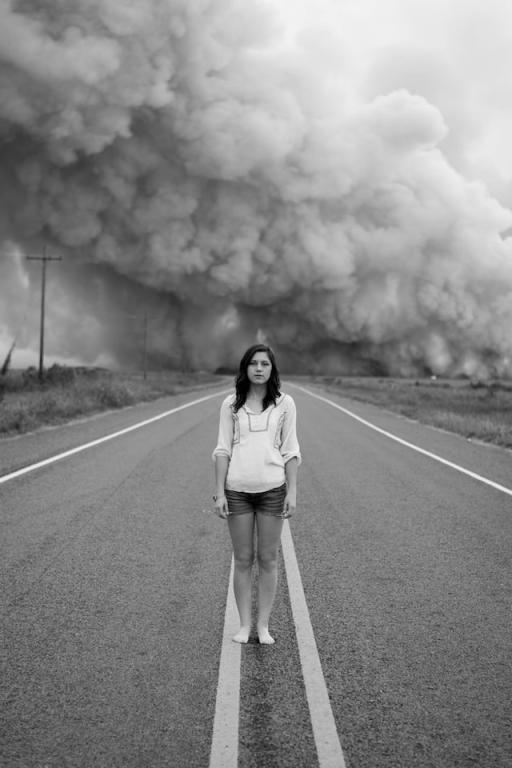I doubt that any of us watched the news without being shaken by the pictures of devastation across Arkansas, Missouri, Kentucky, Illinois, Mississippi, and Tennessee. Towns were shattered. Over two hundred miles of countryside were raked clean by just one of the tornados. And it is still impossible to know how many people lost their lives in a storm caught people unprepared and unprotected.
Years of recovery work lie ahead of the more immediate task of attending to the dead and wounded. And in just seconds the lives of many families and communities were forever changed. It is no exaggeration to admit that the word “recovery” is itself misleading.
How are we to make sense of events of this kind?
At one extreme there are those who will attribute them to the will of God. They will argue that there is a divine, inscrutable purpose at work in what happened. They will note that it is impossible for us to know what good will come from last night. Or they will argue that our faith is being tested.
This argument is rooted in both theological convictions and in deep-seated emotional needs. Some Christians believe that there is no tenet of the Christian faith that is more important than the conviction that God is all powerful. And they also believe that if God is all powerful, then nothing in this world happens without God’s direction or – at a minimum – God’s permission.
So, by definition, the conditions that spawned last night’s storms, the high winds that it generated, the path of the tornados, and the defenselessness of communities like Mayfield, Kentucky were all, by design, the work of God. For those whose faith is shaped by this tenet the logic often holds that specific people were spared and others – by name – perished.
On this reading of things there are only one of two responses that we can offer. We can bow to the will of God and look for the good that God may be trying to bring out of what appears horrible to us. Or we can ask ourselves if we have done something to deserve this disaster or have something to learn.
There are enormous problems with this approach to a disaster like the one our friends and family experienced last night. But the central problem is moral.
If another human being had power of this kind and used it in this fashion, we would instantly label that person a moral monster or criminally insane. Arguing that God does this kind of thing subjects God to the same charge. It also flies in the face of what we hold to be true about the goodness of God and God’s will for us.
Arguing that God has a secret purpose or seeks to teach us through misery of this kind also does nothing to ameliorate that charge. Superior knowledge or power is no defense of immoral behavior in our world. To argue that it might be true of God is not only logically inconsistent, but it is hard to imagine why a God of that kind could justify our love and worship.
At the other end of the spectrum, are those who believe that an event of this kind proves that God does not exist or does not care about us. It will sound strange for me to say this, but I find that reasoning more attractive than the first approach. For years, I have known and worked with people who struggled to recover from suffering that they experienced through no fault of their own. When people have told them that God was the architect of their suffering, they often found it difficult to ever believe that God could or would love them.
That difference aside, however, the conviction that God does not exist, embraces a nihilistic and tragic view of the world. If God does not exist, we may conclude that the kind of tragedy that occurred Friday night is utterly random and meaningless. But if God does not exist or does not care, our existence is random and meaningless as well. We may attribute meaning to our lives and we may even act in loving ways toward our neighbors, but none of that has enduring significance, if our lives are a product of cosmic chance. Our deaths are the end. We are soon forgotten and our civilization faces the same extinction.
So, what counts as a both hopeful and Christian response to the events of this week? Oceans of ink have been spilled in an attempt to answer that question, but allow me to suggest an outline of a faithful answer:
God is not the author of disasters. Creation is God’s good gift and in the beginning it was perfect.
But as an exercise of the freedom that God gave us as beings created in his image – we broke faith with that creation and – in a desire to be our own gods, we and with us, all of creation, now live in a world that is scarred by that desire and by our distance from God’s will.
How and why would that choice has spilled over into nature is hard to say. We are blind to our calling to be God’s viceroys in this world. We underestimate the extent to which God’s longing for us is wed with God’s longing for the whole of creation. We ignore the way in which the spiritual and physical dimensions of life are interwoven.
What we do know is that we were made to live in harmony with God. We regularly prefer to be our own gods and when we do, we are drawn into conflict with God, with one another, and with the world around us. When that happens, things go desperately wrong.
Into that world, however, God returns in the person of Jesus Christ. Like the ultimate First Responder, he enters our world as both deliverer and victim. He re-enters the home that he made for us, to save us from ourselves, from the consequences, and from the disruption that has scarred this creation. And he not only clears a path for us to return to that world for which we were created, but absorbs the pain, the loss, and – ultimately – the death and dying that has scarred it.
The place at which we are offered that hope is not back at the beginning, in Eden or, more accurately, what it represents. It is not offered to us near the end of all things, with moments left to navigate. And that word of hope is not offered to us so that we can escape and leave this world behind us.
It is given to us in that place where we continue to give ourselves to God, where what it means to be made in the image of God continues to unfold, in a world that remains scarred by the disruption that is a product of our distance from God’s good hope for us and for creation. As the Apostle Paul noted, creation groans as if it were giving birth, waiting for us to respond, to seek God, to live in new ways, to embrace the gift that he has longed to give us.
To paraphrase David Bentley Hart: The death of innocents is not the face of God, but the face of the enemy. To believe that may not seem credible to either our friends who believe that everything is God’s will or that the death of innocents is evidence that God does not exist. But that faith is the faith of the church. There are those who will not accept it, but there is no one who can dissuade us.
We are not optimists. We are those who hope. We don’t believe that we will be saved by inventions or legislation or by the god some call “the arc of history.”
We are those who look to the crucified, resurrected, and glorified Christ, and we come alongside the One who enters our pain and finds a way through. And rather than arguing that those who died Friday night served a hidden purpose or symbolize the triumph of death over life, we will embrace and care for them, as Christ cared for us. And in caring we will witness to the one who was born, lived, died, and raised for our sake and who declares, “there shall be no more death, nor sorrow, nor crying, not any more pain, for the former things will have passed away, and…’Behold, I [will] make all things new.’”
Gracious God, Lover of Souls, Healer, Friend, Deliver – in sorrow we lift our prayers on behalf of our brothers and sisters – on behalf of those who have died, on behalf of those who lie in pain, on behalf of those who grieve, on behalf of those who have suffered loss. Come alongside of them, as you have wed your life to those who suffer down through history. Reassure them of your love and presence. Find them in the darkness, sorrow, and bewilderment that fills their souls. Offer your strength. Remind them of your love. Bind their wounds. Come alongside them in your suffering and prompt us to follow you, making ourselves available to their need, their pain, their suffering. Make us yours, in the shadows, in the hard-fought-fight, in victory won, in the triumph we wait to celebrate, in the struggle that remains. Teach us not to sleep or slumber, to faint or surrender. That we might come alongside our brothers and sisters, as you have come alongside of us, until that day when all things are made new and suffering will be no more. In the name of your Son, our Savior, Jesus Christ, who with you and the Holy Spirit, reign one God, now and forever. Amen













